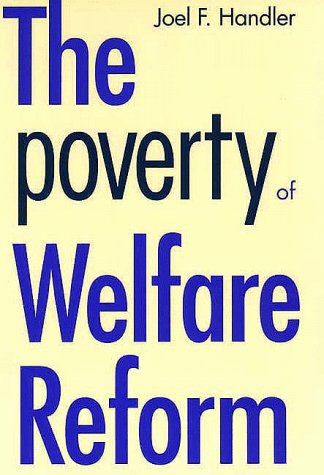Yale Fastback
1 total work
Once again, America is getting tough on welfare. Democrats and Republicans at both the national and state levels seem to have agreed that paying public funds to the poor-particularly to single mothers and their children-perpetuates dependency and undermines self-sufficiency and the work ethic.
In this book Joel Handler, a national expert on welfare, points out the fallacies in the current proposals for welfare reform, arguing that they merely recycle old remedies that have not worked. He analyzes the prejudice that has historically existed against "the undeserving poor" and shows that the stereotype of the inner-city woman of color who has children in order to stay on welfare is untrue. Most welfare mothers are in the labor market, says Handler; however, the work that is available to them is most often low-wage, part-time employment with no benefits. Efforts to move large numbers of welfare recipients to full-time employment are not likely to be successful, especially since most of the welfare programs for single mothers are at the state and local levels, and these governments are reluctant to spend the extra money needed to institute work or other reform programs. Handler suggests that national reform efforts should focus less on welfare and blaming the victim and more on increasing labor markets and reducing poverty through legislation that promotes, for example, the Earned Income Tax Credit and universal health care benefits. Welfare reform, by itself, does nothing to improve the job market, and unless there are more jobs paying more income, we will have done nothing to lessen poverty or reduce welfare.
In this book Joel Handler, a national expert on welfare, points out the fallacies in the current proposals for welfare reform, arguing that they merely recycle old remedies that have not worked. He analyzes the prejudice that has historically existed against "the undeserving poor" and shows that the stereotype of the inner-city woman of color who has children in order to stay on welfare is untrue. Most welfare mothers are in the labor market, says Handler; however, the work that is available to them is most often low-wage, part-time employment with no benefits. Efforts to move large numbers of welfare recipients to full-time employment are not likely to be successful, especially since most of the welfare programs for single mothers are at the state and local levels, and these governments are reluctant to spend the extra money needed to institute work or other reform programs. Handler suggests that national reform efforts should focus less on welfare and blaming the victim and more on increasing labor markets and reducing poverty through legislation that promotes, for example, the Earned Income Tax Credit and universal health care benefits. Welfare reform, by itself, does nothing to improve the job market, and unless there are more jobs paying more income, we will have done nothing to lessen poverty or reduce welfare.
